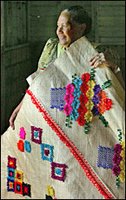 When I read this report in the Herald, I was reminded of the observation made by Thomas Sowell quoted below. From the Herald comes the news that for the king's funeral Tongan villagers are donating gifts they can't afford to a dead monarch who can't use them, and a new monarch who doesn't want them (you might recall the new monarch disparaging the "basket weaving" of "his people" on TV news recently). Says the Herald, "The villagers' generosity is born of tradition, but not all are happy about it":
When I read this report in the Herald, I was reminded of the observation made by Thomas Sowell quoted below. From the Herald comes the news that for the king's funeral Tongan villagers are donating gifts they can't afford to a dead monarch who can't use them, and a new monarch who doesn't want them (you might recall the new monarch disparaging the "basket weaving" of "his people" on TV news recently). Says the Herald, "The villagers' generosity is born of tradition, but not all are happy about it":Tongan tradition grates for someSo why do they do it? Tradition. Culture. Mrs Masila is rightly "unimpressed" at giving away her wealth to pay for a parasite, but she does it anyway. As a cultural practice, who benefits?
A Tongan village has woven thousands of dollars worth of fine mats, donated cash for a pig and will provide baskets of food for the funeral of King Taufa'ahau Tupou IV. The villagers' generosity is born of tradition, but not all are happy about it. Saane Masila (right), a mother of eight, says it actually makes her sick. [...]
At Fahefa, in the northwest of Tongatapu Island, the local women have spent weeks weaving valuable fine mats and making tapa cloths as gifts which will be presented at the palace by their village noble for the late King. Mrs Masila, 38, says she has no idea what will happen to the mats, hundreds of which will be gifted from around the kingdom.
While she says she loved the King she is unimpressed that the mats will go the "rich royal family" when her village could do with the money they could be sold for.
As Thomas Sowell says:
Cultures are not museum pieces. They are the working machinery of everyday life. Unlike objects of aesthetic contemplation, working machinery is judged by how well it works, compared to the alternatives.In this example, which is symbolic of the parasitic relationship of monarch and subjects, "culture" is working bloody poorly for those expected to altruistically donate their time, wealth and energy to celebrate a dead parasite who grew fat (quite literally) off the energy of the people he ruled.
Democracy can't come fast enough for Tonga, but without a change of culture as well as a change of leader then democracy will just deliver them more parasites wanting to grow fat off the largesse the Tongan people can't afford.
RELATED: Multiculturalism, Individualism, Ethics, Politics-World
2 comments:
There are two things where people like Mrs Masila, can do.
First she can refuse to donate any mats or tapa clothing (ngatu). There is no law that she is going to be arrested if she chose not to donate mats, yams, tapa, etc. So, in that case there is free-choice. The only conviction she would have if she refused to donate, is her conscience that the community will isolate her from other communal things, which is a cultural aspect of any society whether european, asian, middle-eastern or any others.
Second, the food that villagers are donating, they themselves will go and partake in the feast at the capital. This huge amount of food such as spit roast pigs, cassava, yams, beef, fish, etc, are prepared using the donated food. So, villagers would love to do that, and at the end of the feast, any left overs are shared. So, the villagers are keen to do that because it is more like a BBQ but on a huge scale. They take their own (donate) to the BBQ and east as much as they can. At the end of the feast, they expect to take some home if there is left over. Europeans do BBQs and people bring their own. Some take back home what is left over (beer, stake, etc,...) from the BBQ.
It is well known in villages that people like Mrs Masila who wouldn't want to donate to such community or national feast do frequently asked for left overs from those who volantarily donated. Well, for me, someone who wouldn't want to donate, but ask for left over, I would simply say, fuck off.
what a useless, unproductive, parasitic pig he was, an embarrassment to the human race
Post a Comment